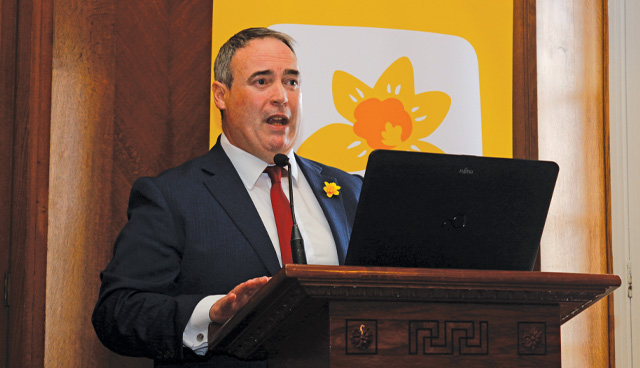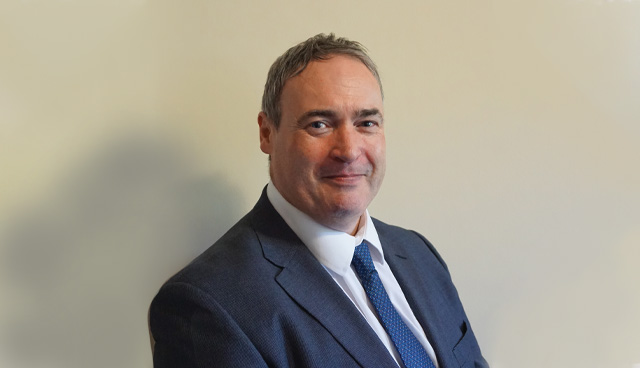A healthy perspective

Colm Gildernew MLA, Chair of the Assembly’s Committee for Health, talks to David Whelan about the committee’s role in healthcare transformation and response to the Covid-19 pandemic.
Gildernew is a fresh face in the Northern Ireland Assembly despite being co-opted to replace his sister over three years ago. The absence of Stormont has meant that January marked the first opportunity for the Fermanagh and South Tyrone MLA to operate in the fully functioning institutions.
Gildernew believes that his experience as a social worker equipped him well to take up the role as Chair of the Health Committee. “My experience of working in the community, in particular the older persons community team has given me an insight into the many issues and indeed the complexities around social care and health in general,” he explains.
“I also believe that work provided me with some of the tools that are an important aspect of my current role; be that self-reflection, circumspection and a range of skills that have helped me navigate some of the issues we have faced.”
Unquestionably, the health and social care sector represented the largest bulk of work following the return of the institutions, even prior to the pandemic outlook.
Outlining what lay in the in-tray of the Health Minister and subsequently the Committee, Gildernew says: “The key pressing issues were the major difficulties facing the health and social care service in relation to waiting lists, which were some of the worst on these islands. Additionally, workforce issues were inherent. We were looking at a situation where nurses were out on picket lines as a result of pay and conditions, but also of staffing levels.
“All of that was in the context of an urgent need to progress the transformation agenda, which we had broad consensus on.”
Unknown at the time was the impact the Covid-19 outbreak would have on the delivery of services and ambitions to urgently deliver health and social care transformation. However, Gildernew stresses that those early ambitions were not completely sidelined as efforts focussed on managing the spread.
“When the extent of the pandemic became clear, to a degree, but only to a degree, those issues were overtaken by the urgency and immediacy of the response to Covid-19. Even throughout Covid-19 the committee has continually engaged with the Department in relation to funding and the need to protect those transformation ambitions.”
Unsurprisingly, Covid-19 has become a huge focus of the committee’s work and Gildernew highlights that members have continued to meet frequently to deal with the volume of work required.
Even throughout Covid-19 the committee has continually engaged with the Department in relation to funding and the need to protect those transformation ambitions.
A large part of that work has centred on the measures introduced by the Executive and the Department. Discussing the role the committee has in shaping those measures, the Chair states: “Our role was to scrutinise the impact of measures and we continue to engage on that. We have been presented with a number of regulations of measures needed to deal with the emergency and our role has been to explore whether those measures are effective.”
An example cited by Gildernew of where the committee has been able to effect positive change is in relation to regulations being brought forward on children’s social care.
“We asked for a briefing from a number of stakeholders and we were able to go back to the Department with a number of suggestions for improvements but also assurances on not only necessary use, but length of use. We were able to build in significant mitigations on behalf of those children who were potentially impacted by those measures in areas such as privacy, digital disadvantage, and the rights of children to be heard.
“It is a good example of how a committee could engage and could impact in a positive way on the measures to ensure that they are is good as they could be in the current circumstances,” he adds.
While Gildernew highlights a continued focus from the committee on those initial health transformation ambitions, undoubtedly, the circumstances for delivery have changed. Existing pressures in the delivery of health and social care are set to be compounded by pent up demand and significant delays in many of the planned actions within the New Decade, New Approach document are now inevitable.
Gildernew admits that new priorities may well need to be established but states the committee’s outlook that those pre-Covid ambitions remain a priority.
“Certainly, new priorities will be identified and one of those that springs to mind is mental health. The committee has facilitated a specific session to look at the surge in mental health needs and we believe there is a need for the Minister and the Department to focus on what could be a significant upswing in terms of demand around mental health services.
“It is welcome that a mental health champion has now been appointed and the Executive has taken mental health on as a significant area of work, cross-cutting all departments, and the committee want to support that.
“However, the committee recognised the need to rebuild services to meet the remaining priorities. I don’t think anything has changes in this regard.”
Gildernew acknowledges that the difficulties and the complexities have increased but adds: “The transformation of our health service remains a priority. It is clear that it wasn’t in a good place coming into this pandemic, so we therefore need to ensure that the work that had been identified is progressed at the earliest stage and to the fullest degree possible.”
Rebuilding health
In June, Health Minister Robin Swann published the Department’s Strategic Framework for Rebuilding Health and Social Care Services. Some have criticised the framework for failing to incorporate the broader necessity for change in the health service, believing that it is largely focussed on the immediate period, as Covid-19 pressures ease.
Asked about the role of the committee in shaping the framework, Gildernew points to engagement with departmental officials, the Minister and the Chief Medical Officer on a range of issues in a bid to see greater involvement in the shaping of the rebuilding of services by health and social care staff.
“We have reflected a strong concern that the rebuilding process should engage as many voices as possible. Particularly, there is an issue around allied health professionals and their level of input into the transformation agenda and shaping the rebuilding plans.
“We have also met with a number of representative bodies, including the unions and we are urging the Department to engage with those unions and to engage with frontline staff, both, in order to learn lessons from Covid-19 and to implement any learning in the shaping of services in a way the addresses the complexity of the issues and utilises the experience of those bodies and groups to better inform future delivery.”
We have reflected a strong concern that the rebuilding process should engage as many voices as possible. Particularly, there is an issue around allied health professionals and their level of input into the transformation agenda and shaping the rebuilding plans.
Gildernew describes it as “sobering” to hear from frontline representatives in relation to the difficulties faced in the early days of the pandemic. Having listened to a range of evidence in his role as Chair of the Health committee, he believes the committee’s role is to add value to the work done during the pandemic by identifying things that potentially could have been done better and highlighting any learnings to prepare the health service for the future.
“In those early days personal protective equipment (PPE) was a huge concern, as was testing and tracing. We have looked in some detail at the care home sector. We do acknowledge that a huge amount of complex and difficult decisions have had to be made in a very short space of time and that there has been good work in that respect.
“Our job is to add value to that in identifying what potentially could have been done better and what we might learn in relation to this pandemic, but also for future pandemics or future health crises here. That may not be in front of us right now but in the future, we will need to be prepared.”
Gildernew points to significant learning which has already been attained such as the requirement to have stockpiles of particular items of PPE and describes the committees work in engaging with various sectors to discuss local supply, adding: “A key lesson which emerged was that, in a pandemic, the world becomes a very competitive place for these products and services. The committee’s role is to assist in that learning, to scrutinise the decisions taken and to see how they might be taken better in future.”
RQIA
One significant fallout of the Department’s handling of the Covid crisis was the resignation of the board of the RQIA, which claimed that decisions were taken in the name of RQIA but without its input around the scaling back of care home inspections.
The Health Minister has since announced an independent review into the circumstances surrounding the resignations, however, Gildernew believes that the committee will continue to look at the RQIA as part of the overall picture in relation to adult social care and the care home situation.
“We have indicated that we would like to continue to engage with RQIA in the spirit of learning lessons from the early weeks of the pandemic and the fact that the sad reality is that over 50 per cent of people who have died as a result of Covid-19 lived in that care home sector. So, there is an urgency there.
“The committee recognises that there is a number of strands to the involvement of RQIA and we will continue to look at the broader picture to ensure that we have a robust regulatory framework in place to protect people in care home settings while the inquiry does its work.”
Looking to the future work of the committee, the Chair says that the committee will work to ensure broad consultation alongside proper co-production and co-design are features of transformation to an improved health service to the future.
“We will also stay tightly focussed on the review of adult social care, which is a very important piece of work. We need to ensure that we build a system that is fit for purpose and that people can be provided with a place to live and enjoy their life. Mental health will also continue to be a focus for the committee and indeed the department.
“We will continue to scrutinise and to maximise the benefit we can bring to the overall picture of improving our health service,” he concludes.






